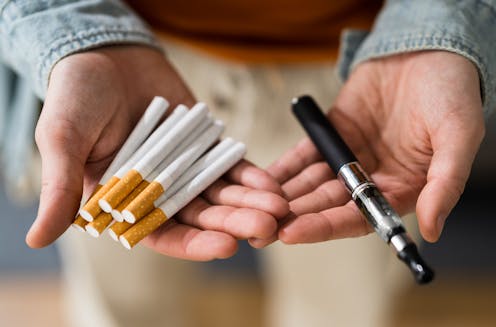No, vapes aren't 95% less harmful than cigarettes. Here's how this decade-old myth took off
- Written by Michelle Jongenelis, Associate Professor, Melbourne Centre for Behaviour Change, The University of Melbourne

It’s 2013. The Harlem Shake is on the radio and e-cigarettes are becoming a thing. A group of researchers convene to discuss these and other products containing nicotine.
In a 2014 paper[1] detailing the outcomes of that meeting, the authors rated “electronic nicotine delivery systems” (e-cigarettes) as having “only 4%” of the maximum relative harm of cigarettes.
Critically, the authors stated their “understanding of the potential hazards” of e-cigarettes was “at a very early stage” because they lacked “hard evidence for the harms of most products on most of the criteria” they examined.
In other words, they noted their work was methodologically weak and their estimates were just that – guesses based on their opinions rather than scientific evidence.
But one of those “guesstimates” has gone on to become the most cited piece of vaping misinformation globally: e-cigarettes are 95% less harmful than tobacco cigarettes.
The problem is, it’s wrong.
Read more: Sex and lies are used to sell vapes online. Even we were surprised at the marketing tactics we found[2]
How the guesstimate took off
Public Health England used the 95% figure in its 2015 review[3] of e-cigarettes, but failed to mention the caveats of the guesstimate.
This prompted widespread criticism from experts. An editorial in The Lancet[4] medical journal labelled the 2014 paper “an extraordinarily flimsy foundation” on which to base the major conclusion of Public Health England’s review.
The Lancet editorial notes Public Health England used the guesstimate despite it being based on “the opinions of a small group of individuals with no prespecified expertise in tobacco control” and “an almost total absence of evidence”.
The 2015 editorial also raised concerns about conflicts of interest, noting that some researchers involved in developing the guesstimate had connections to Big Tobacco[5]. These conflicts were described further in the British Medical Journal in September[6] and November[7].
Despite this, the 95% figure remained in Public Health England’s communications. It had also spread to e-cigarette advertising[8].
By 2020, the guesstimate had become a “factoid”[9]: unreliable information repeated so often it becomes accepted as fact. Yet given the growing evidence of harms associated with e-cigarette use, the factoid was even less valid seven years later.
How it has been used in Australia
The industry and its allies have been so effective at publicising this unscientific guesstimate, it continues to be used to undermine Australia’s public health policy.
In submissions made to Australia’s 2020 Senate Inquiry into Tobacco Harm Reduction[10], industry bodies and allies leaned heavily on the factoid in their arguments for legalising e-cigarettes.
They continued to do so in the 2020 Therapeutic Goods Administration’s consultation[11] on the rescheduling of nicotine as prescription only and most recently in the 2022 consultation[12] on proposed reforms to the regulation of vaping products to limit importation and improve product standards.
Why does it matter?
Although this factoid has been debunked, it continues to influence people’s thinking. Misinformation researchers refer to this as the continued influence effect[13]: once it takes hold, it’s notoriously difficult to dislodge.
As a digestible, attention-grabbing stat, it circulates in the media, and is repeated again and again. And because we are more likely to believe false information when it has been repeated many times (the illusory truth effect[14]), the misinformation becomes “truth”, even after we have been told it’s false.
Even this year, harm-reduction experts have used the factoid to argue vaping is less harmful than smoking and that Australia could look to other countries that legally sell vapes to adults without prescription.
Read more: How bad is vaping and should it be banned?[15]
What’s the solution?
We must debunk the myth[16] that e-cigarettes are 95% less harmful than tobacco cigarettes often and with factual evidence.
e-cigarette use involves the inhalation of toxic substances and is associated with poisoning, lung injury and burns
nicotine e-cigarettes can cause dependence or addiction in non-smokers
young non-smokers who use e-cigarettes are more likely than non-users to initiate smoking and become regular smokers
e-cigarettes do not result in reduced harm if users continue to smoke (which most do[18]). This study found[19] no difference between e-cigarette users’ and smokers’ rates of smoking-related disease and self-reported health six years later.
Public health policies should be informed by impartial evidence, not industry-backed guesses. It’s time to leave the factoid back in 2013 with The Harlem Shake.
Read more: My teen's vaping. What should I say? 3 expert tips on how to approach 'the talk'[20]
References
- ^ paper (www.karger.com)
- ^ Sex and lies are used to sell vapes online. Even we were surprised at the marketing tactics we found (theconversation.com)
- ^ its 2015 review (assets.publishing.service.gov.uk)
- ^ The Lancet (www.thelancet.com)
- ^ connections to Big Tobacco (www.bmj.com)
- ^ September (livrepository.liverpool.ac.uk)
- ^ November (www.hpaf.co.uk)
- ^ e-cigarette advertising (www.sciencedirect.com)
- ^ become a “factoid” (www.ncbi.nlm.nih.gov)
- ^ 2020 Senate Inquiry into Tobacco Harm Reduction (www.aph.gov.au)
- ^ consultation (www.tga.gov.au)
- ^ consultation (www.tga.gov.au)
- ^ continued influence effect (psycnet.apa.org)
- ^ illusory truth effect (thedecisionlab.com)
- ^ How bad is vaping and should it be banned? (theconversation.com)
- ^ debunk the myth (www.climatechangecommunication.org)
- ^ Here (onlinelibrary.wiley.com)
- ^ most do (www.ncbi.nlm.nih.gov)
- ^ This study found (www.europeanreview.org)
- ^ My teen's vaping. What should I say? 3 expert tips on how to approach 'the talk' (theconversation.com)

















